Our Board members
The NC3Rs Board members have expertise in animal and non-animal research, animal welfare and the 3Rs.
Our Board members
- Professor Julia Buckingham CBE (Chair), Institute of Cancer Research
- Professor Cathy Abbott, University of Edinburgh
- Professor Paul Evans, Queen Mary University of London
- Professor Christopher George, Swansea University
- Ms Linda Horan, University of Strathclyde
- Professor Jane Hurst, University of Liverpool
- Dr Tom Matheson, University of Leicester
- Professor Cathy Merry, University of Nottingham
- Professor Nick Plant, University of Leeds
- Dr Sally Robinson, Cancer Research UK Manchester Institute/University of Bristol
- Dr Clive Roper, Roper Toxicology Consulting Limited
- Dr Andy Scott, Unilever
- Dr Robin Buckle, MRC
- Dr Sadhana Sharma, BBSRC
- Dr Vicky Robinson CBE, NC3Rs
Professor Julia Buckingham CBE (Chair), Institute of Cancer Research
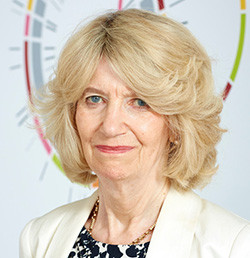
Professor Julia Buckingham CBE is Chair of the Board of Trustees of the Institute of Cancer Research.
Julia has previously held various senior positions including Vice Chancellor and President of Brunel University London and President of Universities UK. She is currently an independent member of Council and Trustee at the University of Surrey, Chair of the Researcher Development Concordat Strategy Group at Universities UK and a member of the Advisory Board at FutureLearn Ltd. She was awarded a CBE in 2018 for services to Biology and Education and elected to the Fellowship of the Academy of Medical Sciences in 2019.
Julia’s research focused on the neuroendocrine mechanisms that control the hypothalamo-pituitary-adrenocortical response to stress. She has been an advocate for the 3Rs throughout her career and sits on the advisory panel for the NC3Rs publishing gateway.
Term ends: December 2027
Professor Cathy Abbott, University of Edinburgh

Following almost 40 years as a researcher and over a decade as a professor at the University of Edinburgh, Cathy is the Chair of Mammalian Genetics within the Centre for Genomic and Experimental Medicine. Her lab works on translation factors in neurodevelopmental disorders and neurodegeneration. During five years as chair of one of the largest Animal Welfare and Ethical Review Bodies in the UK at the University of Edinburgh, Cathy has been determined to put the 3Rs and the culture of care at the heart of all decisions. She has held a project license under the Animals (Scientific Procedures) Act 1986 for over 20 years and has a comprehensive appreciation of the issues faced by researchers, named vets and technicians.
Cathy’s appointments include several funding panels (Cancer Research UK, NC3Rs, Medical Research Scotland), Deputy Chair of the sub-panel for Psychology, Psychiatry, and Neuroscience in the Research Excellence Framework (REF 2021), Research Policy Trustee of the British Neuroscience Association and Athena SWAN panels. Through these positions she has developed a broad and deep understanding of strategic approaches to research, research culture and maximising impact.
Term ends: December 2026
Professor Paul Evans, Queen Mary University of London
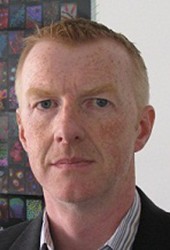
Professor Paul Evans is Professor of Vascular Metabolism at the William Harvey Research Institute, Queen Mary University of London (QMUL). He was previously chair of Cardiovascular Science at the University of Sheffield, as well as Director of the Repair and Regeneration Research Node. His research uses a cross-disciplinary approach to study the biomechanical mechanisms that control atherosclerosis. His work has been recognised by the award of the Medawar Medal (British Transplantation Society), John French Lecture (British Atherosclerosis Society) and Michael Davies Award (British Cardiovascular Society).
At the University of Sheffield he chaired their AWERB and was previously Chair of the European Society for Cardiology Working Group on Atherosclerosis and Vascular Biology. He is currently a member of the MRC's Non-Clinical Fellowships Panel. He has served on the NC3Rs Project Grant and Fellowship panels as well as chairing the Training Fellowship Assessment Panel, and being the academic mentor to the NC3Rs Regional Programme Manager for Yorkshire and the North West.
Term ends: December 2024
Professor Christopher George, Swansea University

Professor Christopher George is based in Swansea University’s Medical School. His research uses molecular tools, cellular imaging and systems-level approaches to explore heart cell behaviour. Current work investigates the fundamental mechanisms that determine cellular network synchronization. His group is developing new frameworks for resolving predictive ‘cause-or-consequence’ scenarios under experimental conditions that mimic normal and disease states.
Chris currently chairs Wales’ National Cardiovascular Research Network and also the Grants Assessment Panel of the National Centre for the 3Rs (NC3Rs). He sits on the Board of the NC3Rs. He is on the editorial board of several Society journals, including Cardiovascular Research, and in 2023 he demitted from the Senior Editorship of the British Journal of Pharmacology. He advocates strongly that robust experimental design and reporting transparency are essential components in the reproducible advance of scientific knowledge.
Term ends: December 2024
Ms Linda Horan, University of Strathclyde
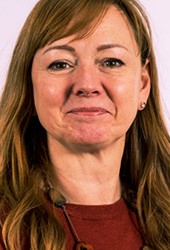
Ms Linda Horan is Manager of the Biomedical Procedures Unit (BPU) at the University of Strathclyde. She has overall responsibility for the BPU, a large multi-discipline laboratory animal facility that supports around 80 personal licensees, providing a vital support service for research and teaching at Strathclyde. In this role she has overseen a merger of two units into one new facility, managed major refurbishment projects and controlled a budget in excess of £0.5M.
Linda has over thirty-five years’ experience in managing animal facilities. She is the current Convenor of the ScotPIL committee and has helped to deliver its accredited training courses, which have trained over one thousand Home Office personal licensees. She has held various roles within the professional body the Institute of Animal Technology (IAT) and in 2019 became Chair/Chief Executive Officer of the IAT Council.
Term ends: December 2024
Professor Jane Hurst, University of Liverpool
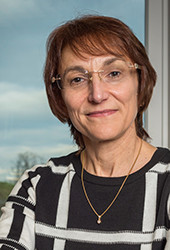
Professor Jane Hurst is the William Prescott Chair of Animal Science and Head of the Mammalian Behaviour and Evolution Group at the University of Liverpool. Her main research interests are scent communication in mammals, animal welfare (particularly that of laboratory animals), humane rodent pest control, the evolution of different mammalian social strategies, and the interactions between behaviour and disease. She led the original research into non-aversive mouse handling methods, which won the 2010 3Rs Prize and has since been developed into key resources in partnership with the NC3Rs.
Jane is currently Deputy Chair of the BBSRC Appointments Board and a member of the Royal Society’s Research Appointment Panel B. She served as the President of the Association for the Study of Animal Behaviour (ASAB) from 2010 to 2012 and was awarded the ASAB Medal in 2017. Jane was awarded an OBE in the 2020 New Year Honours for services to animal welfare.
Term ends: December 2024
Dr Tom Matheson, University of Leicester
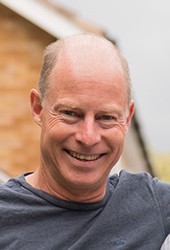
Dr Tom Matheson is a Reader in Neurobiology at the University of Leicester and a Senior Fellow of the Higher Education Academy. He studies how nervous systems control behaviour, with interests in sensory-motor processing, neuronal plasticity and biomechanics. His team combines electrophysiological recording techniques with quantitative behavioural analyses to study the natural aimed limb movements of insects. In other research he explores the interactions between organisms and their environment – particularly in the context of locust swarm formation. His multidisciplinary research involves collaborations with engineers, mathematicians, molecular biologists and statisticians.
Tom carried out his PhD at the University of Canterbury in New Zealand before undertaking a series of postdoctoral positions at the University of Cambridge. He then moved to a lectureship at the University of Leicester before being promoted to Reader. Tom has previously sat on the NC3Rs Grant and Training Fellowship Assessment Panels, and the NC3Rs Expert Working Group for Impact. He is currently a member of BBSRC Grant Panel A and is a former BBSRC Advanced Research Fellow and BBSRC Research Development Fellow.
Term ends: December 2024
Professor Cathy Merry, University of Nottingham
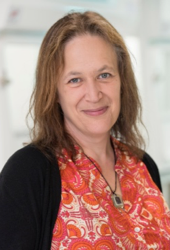
Professor Cathy Merry is Professor of Stem Cell Glycobiology at the University of Nottingham. Her interdisciplinary research group works to understand the role of glycosaminoglycans (complex sugars) in the cell biology of healthy and diseased tissues. Currently the group is focused on creating models of disease that recapitulate the natural extracellular matrix. She studied Biochemistry at the University of Manchester, during which time she spent a year working for Amgen Inc. in California. She remained at Manchester, working at the Paterson Institute for her PhD and postdoctoral work, before establishing an independent research group in the School of Materials. Following a sabbatical at Uppsala University in Sweden she returned to the UK to join the School of Medicine at the University of Nottingham where she now works in the Nottingham Biodiscovery Institute and is Deputy Director of Research for the School.
Cathy was previously a member of Against Breast Cancer’s Advisory Board and the NC3Rs Grant Assessment Panel. She is currently a member of the NC3Rs Studentship Assessment Panel.
Term ends: December 2024
Professor Nick Plant, University of Leeds
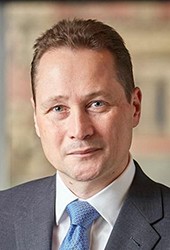
Professor Nick Plant is Deputy Vice-Chancellor of Research and Innovation at the University of Leeds, and a Professor in Systems Biology. His research interests focus on how the body coordinates its response to chemical challenge, using computational approaches to predict the health impact of chemical exposure. He has worked with partners from academia and industry to integrate complex datasets from disparate experimental approaches, increasing our understanding of the processes that lead to fatty liver disease and breast cancer.
Nick was enrolled as a Fellow of the Royal Society of Biology in 2016. He has served on the Committee for Toxicity on Chemicals in Food, Consumer Products and the Environment, as well as the Medicines and Healthcare Products Regulatory Agency Pharmacovigilance Expert Advisory Group and Nicotine Containing Products Working Group. He is currently Chair of the NC3Rs Skills and Knowledge Transfer Award Assessment Panel and has also been a member of the NC3Rs Grant Assessment Panel, Fellowship Panel and 2018 3Rs Prize Panel. Since 2015, he has been on the roster of experts for the Joint FAO/WHO Expert Committee on Food Additives (JECFA).
Term ends: December 2024
Dr Sally Robinson, Cancer Research UK Manchester Institute/University of Bristol
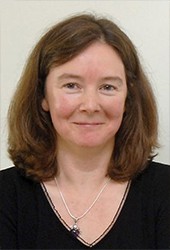
Dr Sally Robinson is Chair of the AWERB at Cancer Research UK Manchester Institute and the University of Bristol. A toxicologist by training, she has over 25 years of experience in the pharmaceutical industry with a focus on the application of the 3Rs. Between 2008 and 2013 she managed AstraZeneca’s Home Office Compliance Group, and between 2012 and 2013 she represented AstraZeneca on the UK Bioscience Coalition, which focused on the transposition of EU Directive 2010/63 to UK law.
Sally received the Society of Toxicology’s ‘Enhancement of Animal Welfare’ award in 2009 for leading a cross-industry NC3Rs project that led to changes in international regulatory guidance. She is currently Chair of the European Federation of Pharmaceutical Industries and Associations (EFPIA) Research and Animal Welfare Group and a member of the UK Home Office’s Animals in Science Committee.
Term ends: December 2024
Dr Clive Roper, Roper Toxicology Consulting Limited

Dr Clive Roper is owner and major shareholder of Roper Toxicology Consulting Limited. He was previously director of the department of In Vitro Toxicology at Charles River Laboratories where his department performed regulatory in vitro skin absorption, in vitro respiratory toxicology, in vitro safety pharmacology, investigational and mechanistic toxicology focussed on tissues and 3D models. Following post-doctoral research at Newcastle University, he joined Inveresk Research (acquired by Charles River in 2004) as a Research Officer. After serving in study director and scientific manager roles, he became Head of In Vitro Sciences and subsequently Director of In Vitro Toxicology.
Clive has been actively involved in advising regulatory agencies as well as industry bodies in understanding and acceptance of existing and New Approach Methodologies. He is also a member of the global Charles River 3Rs Working Group and a founding member of the North American 3Rs Collaborative.
Term ends: December 2024
Dr Andy Scott, Unilever

Dr Andy Scott joined Unilever’s Safety & Environmental Assurance Centre in 2001 after completing a BSc in Biochemistry and Microbiology at the University of Leeds; a PhD and MRC funded post-doc at the University of Wales Swansea; and a European Science Foundation fellowship at the Institut Gustave Roussy in Paris. He was awarded an honorary professorship by the College of Medicine, Swansea University in April 2013.
Andy has extensive risk assessment and consumer safety science experience, particularly in relation to Mutagenicity and Carcinogenicity, and a strong interest in the development and application of animal alternative approaches to safety assessment. His specialism in genetic toxicology and advancing new approach methodologies (NAMs) for safety assessment is exemplified by his involvement in international working groups (ECETOC and OECD), as former Chair of the UK Industrial Genotoxicity Group, elected Committee Member of the UK Environmental Mutagen Society, Advisor to the UK Committee of Mutagenicity, and invited participant at the International Workshops on Genotoxicity Testing.
Andy is passionate about high quality, hypothesis-led research and specifically that which aims to advance the 3Rs agenda towards wider use/acceptance of non-animal-based approaches; and which also provides opportunity for the development of next generation scientists. Over the past decade Andy has worked closely with the NC3Rs to shape our collaborations and innovation programmes with Unilever. He has been involved in NC3Rs workshops, joint studentships, and the CRACK IT Challenge programme.
Term ends: December 2026
Dr Robin Buckle, MRC

Dr Robin Buckle represents the MRC on the NC3Rs Board. He is Chief Science Officer at the MRC, a role that includes responsibility for the MRC’s Units, Centres, and Institutes, as well as its head office scientific operations, Boards and Committees. He provides leadership for major science implementation programmes in select areas and acts as an ambassador for the MRC, developing networks and inter-organisational relationships and providing a public voice both nationally and internationally. He works to optimise internal and external communications, funding, review and governance arrangements, to ensure continuous evolution and integration of the MRC's work into UKRI.
Dr Sadhana Sharma, BBSRC
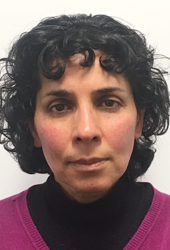
Dr Sadhana Sharma represents the BBSRC on the NC3Rs Board. She is the Interim Head of Strategy for Bioscience for Health at the BBSRC and is responsible for leadership and coordination of this strategic area, which encompasses Lifelong Health, Nutrition for Health, One Health and Biotechnology for Health.
Dr Vicky Robinson CBE, NC3Rs

Dr Vicky Robinson CBE is the Chief Executive of the NC3Rs. For more information, please see her staff page.
Board Members are appointed in a personal capacity for three years, with the possibility of a further two years extension. They are required to declare any private, professional or commercial interests that might, or that might be perceived to, conflict with the NC3Rs' interests.

